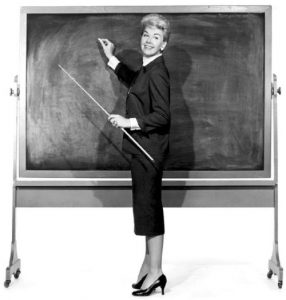
It’s a common refrain among the reformer Illuminati whenever they experience any push-back against their anti-teacher, anti-union, anti-public education, anti-Motherhood-apple-pie-and-hot-dogs agenda. You can bet your bottom privatization dollar that as soon as these edu-tourists hear any reasonable, evidence-based rationale refuting their radical positions on teacher evaluation, tenure or the use of Value-Added Measures, they will inevitably blurt out the one magic incantation they believe will repel all attacks, confident in its power to tug at the heartstrings of any parent/voter: “But, it’s all about the kids!”
(Let’s leave aside the notion for the moment that this well-funded clique of hedge fund managers, investment bankers and failed morning show hosts suddenly cares about kids after spending their entire adult lives making backroom deals and raiding pension funds. There is obvious power in this spell, which is designed to cut through logic and reason, and appeal directly to the most primal instincts of any parent.)
The truth is that education and schools are not, and should not be, all about the kids. If we truly want our schools to be healthy, highly-functional institutions, then every member of the school community must be treated with honor, dignity and respect. This includes adults as well as children.
It means that every person who works in the school–from teachers to principals, from custodians to secretaries, from bus drivers to cafeteria workers, from nurses to counselors, from students to parents–deserves to work and learn in an environment where they feel trusted and valued.
It means that the working conditions of teachers cannot be separated from the learning conditions of students, and that when one member of the community is devalued there is a devastating ripple effect across the rest of the community.
It also means that as teachers, we need to stop romanticizing our profession. We can start by not referring to teaching as a “calling,” as though we are clergy or missionaries. We can also stop using hackneyed phrases such as “Teaching. I’m not in it for the income; I’m in it for the outcomes,” or other meme-worthy sayings that imply that teachers don’t need to be compensated fairly, or don’t require adequate benefit packages, like health care insurance and pensions.
When we talk about our profession in these ways we play right into the reformer’s game plan, which is to degrade and dehumanize the teaching force as mere delivery systems for test prep materials and canned curricula. If we don’t value ourselves as dedicated, committed, well-educated professionals with deep subject matter expertise and rich pedagogical abilities and understandings, then why be surprised when the reformers suggest that veteran teachers can be replaced with uncertified, unqualified Teach for America recruits bolstered by a mere 5 week summer boot camp’s worth of “training”?
The truth is that teaching is not a “calling,” or a “mission”–it’s a job, and a darned hard one at that. Those who choose this profession do so because they are deeply committed to the education of all children, and they demonstrate this commitment by doing their jobs under often difficult conditions, and while under nearly constant attack from the reformers, the media and the public. Teachers deserve to be treated with respect, paid fairly, and trusted to do their jobs without the threat of invalid and unreliable “accountability measures” imposed by persons who have never set foot in a school classroom. If we as a society really value our children’s education as much as we say we do, then we need to treat teachers as equal partners in our children’s education, and stop pretending that “it’s all about the kids,” because “it’s” not.
The diversity statement of the University of Chicago Lab School, founded by American progressive educator and philosopher John Dewey, says it best:
“Whether parents, faculty, administrators, or staff, members can expect to receive respect and to extend respect to others. Only when our community functions in a healthy manner can we provide a beneficial environment for our students.”
And only when we start treating teachers with honor, dignity and respect will we get the schools that our children, and our society, deserve.



